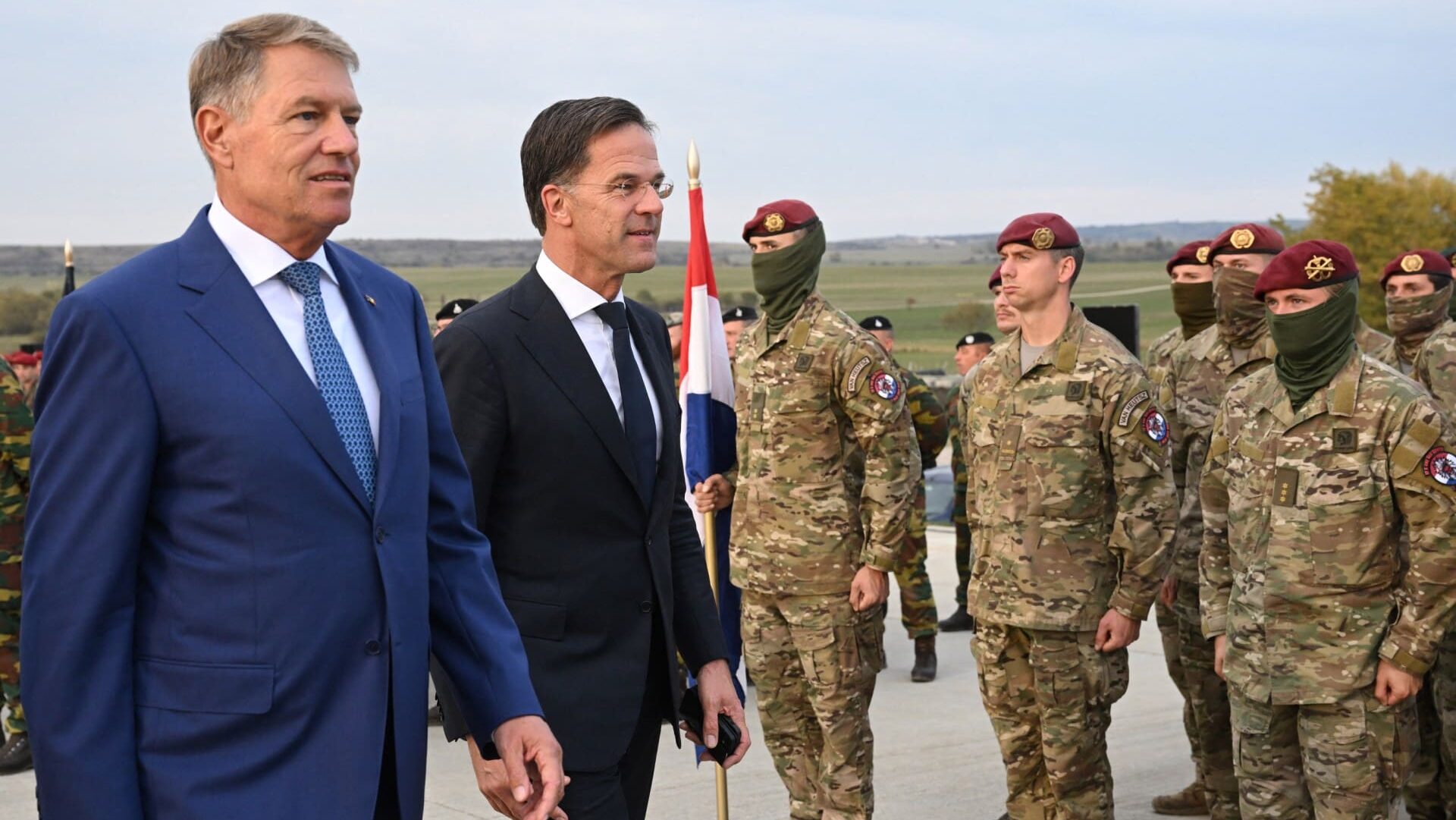
Romanian President Klaus Iohannis (left) and then-Dutch PM Mark Rutte visit a NATO military base in Romania in 2022.
Photo: Daniel Mihailescu / AFP
Mark Rutte, the Netherlands’ outgoing liberal prime minister, is likely to soon complete his successful bid to lead NATO. Hungary and Slovakia have officially endorsed his candidacy in exchange for certain guarantees, meaning the Atlantic defense organization only needs Romania’s nod to formalize Rutte’s ascendancy.
Subject to the withdrawal of President Klaus Iohannis’ candidacy, Rutte could be appointed to the role during NATO’s July 9-11 Washington summit.
Rutte appears to continue the well-established European tradition that whenever a politician fails at home, they have a good chance of being rewarded with a better post in Brussels (think of António Costa or von der Leyen herself). No one here stays unemployed for very long.
Recall that Rutte and his decade-long approach to governance were overwhelmingly rejected by the Dutch voters in last November’s general elections, which saw the national conservative Geert Wilders take the lead in The Hague. In a few months, however, the politician rejected by his own people will fail upwards and be put in charge of the world’s largest military alliance.
To ensure that this happens smoothly, the caretaker Dutch PM personally conducted talks with Budapest and Bratislava’s leadership on the sidelines of Monday’s European Council meeting in Brussels.
The result of his discussion with Hungarian PM Viktor Orbán was announced by the latter on X. He said that since Rutte confirmed that he would uphold Budapest’s recent deal with outgoing NATO chief Jens Stoltenberg, Hungary was “ready to support [his] bid for NATO Secretary-General.”
The deal Orbán referred to was negotiated last week, and grants Budapest an opt-out from the Alliance’s joint actions on Ukraine, including sending military and financial aid, as well as an exception from taking part in possible future NATO missions inside Ukraine.
Following the recent European elections, where Hungarians voted in huge numbers in favour of #peace, we reached an important agreement with #NATO Secretary General @jensstoltenberg . We agreed that no Hungarian personnel will take part in the activities of NATO in Ukraine and no… pic.twitter.com/Cliu4rZGCE
— Orbán Viktor (@PM_ViktorOrban) June 18, 2024
Furthermore, the Hungarian government had previously complained about statements made by Rutte in 2021, when he said Hungary had “no place in the EU” and that Brussels should force it down “on its knees,” after Budapest adopted a child-protection law that was deemed discriminatory to the LGBT community by Brussels.
In exchange for endorsement, therefore, Budapest has also asked for Rutte’s apology for insulting the country. That, of course, he was unwilling to do—but at least he recognized that his words might not have been appropriate. “As discussed, I also took note that some remarks I made in 2021 as Prime Minister of the Netherlands have caused dissatisfaction in Hungary,” Rutte said of his meeting with Orbán.
Slovakia, in turn, was even easier to convince. President Peter Pellegrini admitted that he would have preferred someone from Central or Eastern Europe to take charge of NATO for a change—all Secretaries-General had been from Western Europe to date, and Rutte is the fourth Dutchman to take the post—but Bratislava “can imagine” supporting Rutte in exchange for a new anti-aircraft air-defense system to replace the country’s single S-300 it had previously donated to Ukraine.
“Slovakia no longer has an anti-aircraft defense system today, which is why I discussed with Rutte the situation in which, if he is elected Secretary-General of the Alliance, make efforts to ensure the protection and defense of Slovakia’s airspace—at least until Slovakia is able to secure its airspace with its own capabilities,” Pellegrini explained.
Rutte, for his part, promised to swiftly resolve the problem. “We will call on NATO to find somewhere in the member states an anti-aircraft system” until it acquires one of its own, the Dutch politician said, while also pledging to take into account the “geographical principle” when filling lower positions as NATO chief, giving fair representation to Eastern Europe.
This means only Romania’s vote is missing from the unanimous endorsement, but NATO officials are certain the country would fall in line by the Washington Summit at the latest. As it happens, Bucharest first would need to withdraw the candidacy of President Klaus Iohannis, who had been considered one of the most viable options for finally installing an Eastern European NATO chief.
Romanian media is speculating about why Iohannis is waiting until the last minute to withdraw when it’s clear that he can’t stand against Rutte in July. Some suggest that he may be trying to leverage his veto for “something else,” since his term as president will also run out by the end of the year.
One such position could be that of EU foreign policy chief, currently promised to Estonian PM Kaja Kallas, representing the liberal Renew camp in the Council negotiations. The problem is that while Iohannis would probably be better suited and more easily accepted in the job, his National Liberal Party (PNL) is part of the centrist EPP, which is already set to take two of the EU’s four top jobs in the next five years.
We ended a very productive&substantial #B9 Summit in 🇱🇻. We are committed&united in our endeavour to protect Allied territory&citizens, bringing added-value to our Alliance as a whole. NATO’s key purpose&greatest responsibility is to ensure our collective defence. #1NATO75years pic.twitter.com/ijYgWIbQb0
— Klaus Iohannis (@KlausIohannis) June 11, 2024
